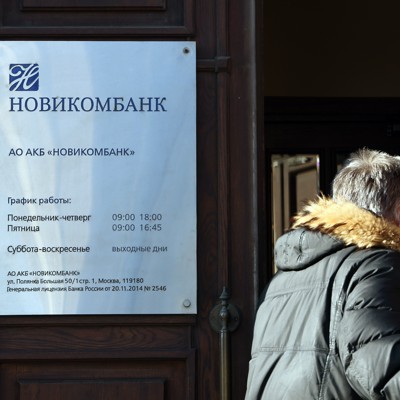The Biden administration this week announced economic sanctions targeting the Russian and Belarusian defense industries in response to the invasion of Ukraine.
Among the entities targeted is Novikombank, a bank that “primarily operates in the Russian defense sector and serves as the core financial institution for Russian defense company Rostec, which fully owns the bank,” according to the U.S. Treasury Department. Rostec is the state-owned holding company that makes investments in Russia’s defense and tech sectors.
The U.S. also sanctioned the Minsk Wheeled Tractor Plant, also known as MZKT, which makes armored vehicles that carry Russian surface-to-air missiles. “It sells its products globally on behalf of the Lukashenka regime, including vehicle chassis that are exported to Iran and Russia, the latter of which places regular orders with MZKT for use in Russia’s defense sector,” the Treasury Department said in a statement.
Here’s the full list of Russian and Belarusian sanctions from the Treasury Department.
Some U.S defense companies could also end up in the middle of the sanctions, specifically those that source titanium from Russia or sell aircraft parts to Russian planemakers. Read more about that here.
And in other sanction-related news, China sanctioned Raytheon Technologies and Lockheed Martin over a $100 million deal to maintain Taiwan’s missile defenses.
Meanwhile, Delta Air Lines has cut ties with Aeroflot, Politico’s Betsy Woodruff Swan and Oriana Pawlyk report.
There’s a new Defense Department supply chain report out. “It focuses specifically on addressing challenges in high-priority areas critical to operational readiness, including kinetic capabilities, energy storage and batteries, castings and forgings, microelectronics, and strategic and critical materials,” the Pentagon said. “The department also highlights a set of strategic enablers that underpin overall mission success and supply chain resilience, such as workforce, cyber posture, small business, and manufacturing capabilities.”
While we’ve yet to hear a single U.S. Defense Department official articulate the Pentagon’s mergers and acquisition policy, CEOs continue to see large M&A being off the table following the Biden administration torpedoing Lockheed’s $4.4 billion acquisition of Aerojet Rocketdyne. “I think it’s hard to do M&A,” Raytheon Technologies CEO Greg Hayes said this week at a Barclays investment conference. “Today, I think…with the Biden administration and the FTC taking some of the positions. I think it’s unlikely that there’s going to be a big appetite to do any further consolidation in the A&D industry.”
Reminder, United Technologies and Raytheon merged in 2020—a deal that many analysts and observers believe the Biden administration would have tried to block. “I think our timing was fortuitous,” Hayes said.
Still, Raytheon sees itself doing what Hayes called “fill-in M&A” to the tune of about $1 billion each year. Hayes also said Raytheon would look to divest “a couple of businesses” within its Collins Aerospace division “that I think don’t fit.”
“I don’t want to give these businesses away,” he said. “We want to make sure that they are good, solid businesses, and that we can get full and fair value for them. And if we can’t, we’ll keep them.”
 From Defense One
From Defense One
The country plays a small but important role in both supply chains and sales.
Air Force officials had already started retiring 30-year-old E-8C JSTARS.
DOJ’s Lisa Monaco warns industry to harden defenses; Ukraine’s foreign weapons systems are a likely target for Russian hackers.
Russia’s advances are encountering more resistance than expected, U.S. defense official says, as forces encircle Kyiv.
The White House also announced sanctions to limit Russia’s access to cutting-edge technologies.
Moscow doesn’t need troops and roadblocks to isolate a target country.
Rome seems happy to contribute more than their share of ground troops and jets to NATO missions—as long as they can do it sotto voce.


